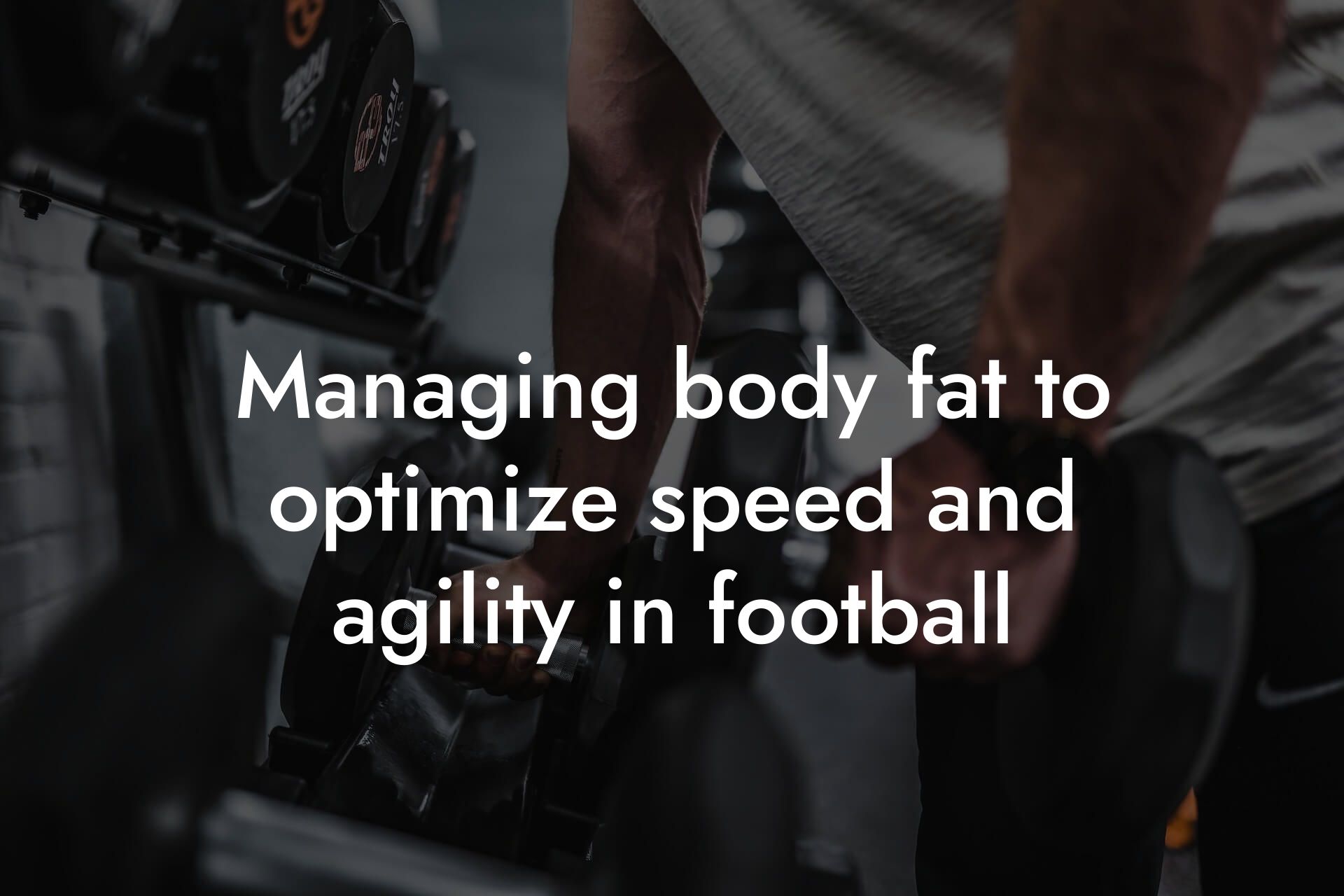Understanding the Demands of Football
As a football player, you know that the sport demands a high level of physical fitness, strength, and endurance. The season can be grueling, with intense training sessions, games, and travel taking a toll on your body. To maintain peak performance, it's essential to understand the physical demands of the sport and take proactive steps to optimize your training, nutrition, and recovery.
Table of Contents
- Understanding the Demands of Football
- Periodized Training for Optimal Performance
- Nutrition for Optimal Performance
- Hydration and Electrolyte Balance
- Injury Prevention and Management
- Recovery Techniques for Enhanced Performance
- Monitoring Your Body Composition
- Mental Preparation and Visualization
- Frequently Asked Questions
Periodized Training for Optimal Performance
A well-structured training program is crucial for achieving peak performance during the football season. Periodized training involves dividing your training into specific phases, each with a unique focus and intensity. This approach helps to avoid plateaus, prevent overtraining, and ensure that you're peaking at the right time.
A typical periodized training program for football players includes:
- Pre-season: Focus on building endurance, strength, and power
- In-season: Emphasize maintenance and recovery, with reduced intensity and volume
- Post-season: Active recovery and rehabilitation to address any injuries or imbalances
Nutrition for Optimal Performance
Nutrition plays a critical role in maintaining peak performance during the football season. A well-balanced diet provides the necessary fuel for your body to perform at its best. Focus on consuming:
- Complex carbohydrates: Whole grains, fruits, and vegetables for energy and recovery
- Lean protein: Chicken, fish, and lean beef for muscle repair and growth
- Healthy fats: Nuts, seeds, and avocados for energy and hormone regulation
Avoid sugary drinks and processed foods, which can hinder performance and recovery. Stay hydrated by drinking plenty of water throughout the day.
Hydration and Electrolyte Balance
Proper hydration is essential for maintaining peak performance during the football season. Aim to drink at least 8-10 glasses of water per day, and make sure to consume electrolyte-rich beverages during and after intense training sessions or games.
Electrolytes, such as sodium, potassium, and magnesium, play a crucial role in regulating fluid balance, nerve function, and muscle contractions. Include electrolyte-rich foods like bananas, avocados, and nuts in your diet, and consider using electrolyte supplements during intense periods.
Injury Prevention and Management
Injuries are an inevitable part of the football season, but there are steps you can take to prevent and manage them. Focus on:
- Incorporating injury prevention exercises into your training program, such as strengthening your core and glutes
- Warming up and cooling down properly to reduce the risk of muscle strains and tears
- Listening to your body and taking regular breaks to avoid overtraining and fatigue
If you do sustain an injury, prioritize rest, recovery, and rehabilitation to ensure a speedy return to the field.
Recovery Techniques for Enhanced Performance
Recovery is a critical component of maintaining peak performance during the football season. Incorporate the following techniques into your routine:
- Stretching and foam rolling: To improve flexibility and reduce muscle soreness
- Compression garments and sleeves: To improve blood flow and reduce muscle oscillation
- Cryotherapy and ice baths: To reduce inflammation and improve recovery
- Sleep and relaxation techniques: To optimize sleep quality and reduce stress
Monitoring Your Body Composition
As a football player, your body composition plays a critical role in your performance. Monitoring your body fat percentage, lean mass, and bone density can help you optimize your training and nutrition program.
DEXA scans, like those offered by Tano Performance Group, provide a comprehensive assessment of your body composition, allowing you to:
- Track changes in body fat percentage and lean mass
- Identify areas for improvement, such as increasing bone density
- Optimize your training and nutrition program for peak performance
Mental Preparation and Visualization
Mental preparation and visualization are essential components of maintaining peak performance during the football season. Focus on:
- Developing a positive mindset and confidence in your abilities
- Visualizing yourself performing at your best, including successful plays and game scenarios
- Practicing mindfulness and relaxation techniques to manage stress and pressure
By incorporating mental preparation and visualization into your training program, you can gain a competitive edge and perform at your best when it matters most.
Maintaining peak performance during the football season requires a holistic approach that incorporates periodized training, optimal nutrition, hydration, injury prevention, recovery techniques, body composition monitoring, and mental preparation. By following these guidelines and staying committed to your training program, you can optimize your performance and achieve success on the field.
Frequently Asked Questions
What are the most common challenges football players face during the season?
Football players often struggle with maintaining their physical performance, managing fatigue, and preventing injuries. The intense physical demands of the sport, combined with the pressure to perform at a high level, can take a toll on their bodies. Additionally, the condensed schedule and frequent travel can disrupt their training and recovery routines, making it even more challenging to maintain peak performance.
How can I optimize my nutrition to support my performance on the field?
A well-planned nutrition strategy is essential for optimal performance. Focus on consuming a balanced diet that includes plenty of complex carbohydrates, lean protein, and healthy fats. Aim to eat a meal or snack that includes a source of protein and complex carbohydrates within 30-60 minutes after a game or intense training session to aid in recovery. Stay hydrated by drinking plenty of water throughout the day, and consider working with a sports dietitian to develop a personalized nutrition plan.
What role does sleep play in maintaining peak performance?
Sleep is critical for physical recovery and mental preparation. Aim for 7-9 hours of sleep each night to help your body repair and adapt to the physical demands of the sport. Establish a consistent sleep schedule, create a relaxing bedtime routine, and avoid screens and stimulating activities before bedtime to improve the quality of your sleep.
How can I incorporate strength training into my off-season program?
Strength training is essential for building power, speed, and endurance. Focus on exercises that target multiple muscle groups at once, such as squats, deadlifts, and bench press. Incorporate plyometric exercises, such as jump squats and box jumps, to improve your explosiveness. Aim to strength train 2-3 times per week, with at least one day of rest in between, to allow for adequate recovery.
What are some common injuries that football players experience, and how can I prevent them?
Football players are at risk for a variety of injuries, including concussions, knee injuries, and shoulder injuries. To prevent injuries, focus on proper tackling and falling techniques, wear proper protective gear, and incorporate exercises that strengthen your core and improve your flexibility. Additionally, prioritize proper warm-up and cool-down routines, and listen to your body and take regular breaks to avoid overtraining.
How can I stay motivated and focused during the long football season?
Staying motivated and focused requires a combination of physical and mental preparation. Set specific, measurable, and achievable goals for yourself and your team, and celebrate your successes along the way. Develop a pre-game routine that gets you pumped up and ready to perform, and stay connected with your teammates and coaches to maintain a sense of camaraderie and accountability.
What are some effective ways to manage game-day nerves and anxiety?
It's normal to feel nervous and anxious before a big game. To manage your nerves, focus on deep breathing exercises, visualization techniques, and positive self-talk. Develop a pre-game routine that helps you feel calm and focused, and try to reframe your nerves as excitement and energy. Remember that you've prepared well and trust in your abilities.
How can I balance my football commitments with other aspects of my life?
Balancing football with other aspects of your life requires careful time management and prioritization. Set clear boundaries and communicate with your coaches, teammates, and loved ones about your needs and limitations. Make time for activities that bring you joy and fulfillment outside of football, and prioritize self-care and relaxation to avoid burnout.
What are some key performance indicators (KPIs) that I should track during the season?
Tracking key performance indicators (KPIs) can help you identify areas for improvement and optimize your performance. Consider tracking metrics such as your 40-yard dash time, vertical jump, and pro agility shuttle. Additionally, track your body fat percentage, bone density, and other health metrics to ensure you're performing at your best.
How can I stay hydrated during games and practices?
Staying hydrated is critical for optimal performance. Aim to drink at least 8-10 glasses of water per day, and make sure to drink water or a sports drink during games and practices. Monitor your urine output and color to ensure you're staying hydrated, and avoid sugary drinks and caffeine that can dehydrate you.
What are some effective ways to recover after a game or intense practice?
Proper recovery is critical for optimal performance. Focus on stretching and foam rolling to reduce muscle soreness, and incorporate activities such as yoga or light cardio to promote blood flow and relaxation. Use compression garments and ice baths to reduce inflammation, and prioritize rest and relaxation to allow your body to recover.
How can I maintain my physical performance during the off-season?
Maintaining your physical performance during the off-season requires a combination of strength training, conditioning, and active recovery. Focus on building your strength and endurance through exercises such as squats, deadlifts, and lunges. Incorporate conditioning exercises such as hill sprints and pro agility shuttles, and make time for active recovery activities such as yoga and light cardio.
What are some common mistakes that football players make during the season, and how can I avoid them?
Common mistakes that football players make during the season include neglecting their nutrition, not getting enough sleep, and failing to prioritize recovery. Avoid these mistakes by prioritizing your nutrition, getting enough sleep, and making time for recovery activities such as stretching and foam rolling.
How can I stay connected with my teammates and coaches during the season?
Staying connected with your teammates and coaches is critical for success on the field. Make time for team-building activities such as team dinners and community service events, and prioritize communication with your coaches and teammates through regular meetings and check-ins.
What are some effective ways to manage stress and anxiety during the season?
Managing stress and anxiety requires a combination of physical and mental preparation. Focus on deep breathing exercises, visualization techniques, and positive self-talk to manage your nerves. Prioritize self-care activities such as meditation, yoga, and reading, and make time for relaxation and rest to avoid burnout.
How can I prioritize my mental health during the season?
Prioritizing your mental health is critical for optimal performance. Make time for activities that bring you joy and fulfillment outside of football, and prioritize self-care activities such as meditation, yoga, and reading. Seek support from teammates, coaches, and mental health professionals if you're struggling with stress, anxiety, or other mental health concerns.
What are some key signs of overtraining, and how can I avoid it?
Signs of overtraining include fatigue, decreased performance, and increased risk of injury. Avoid overtraining by prioritizing rest and recovery, listening to your body and taking regular breaks, and incorporating activities such as yoga and light cardio to promote active recovery.
How can I stay flexible and mobile during the season?
Staying flexible and mobile requires a combination of stretching, foam rolling, and active recovery. Incorporate exercises such as leg swings, arm circles, and hip openers into your warm-up and cool-down routines, and make time for activities such as yoga and Pilates to improve your flexibility and mobility.
What are some effective ways to boost my immune system during the season?
Boosting your immune system requires a combination of proper nutrition, adequate sleep, and stress management. Focus on consuming a balanced diet that includes plenty of fruits, vegetables, and lean protein, and prioritize getting enough sleep each night. Manage your stress through deep breathing exercises, visualization techniques, and positive self-talk.
How can I maintain my bone density during the season?
Maintaining your bone density requires a combination of proper nutrition, strength training, and adequate calcium and vitamin D intake. Focus on consuming a balanced diet that includes plenty of calcium-rich foods such as dairy and leafy greens, and incorporate strength training exercises that target multiple muscle groups at once.
What are some effective ways to track my progress and stay motivated during the season?
Tracking your progress and staying motivated requires a combination of goal-setting, self-reflection, and accountability. Set specific, measurable, and achievable goals for yourself, and track your progress through metrics such as your 40-yard dash time and body fat percentage. Share your goals and progress with a friend or accountability partner to stay motivated and on track.
How can I balance my football career with my long-term goals and aspirations?
Balancing your football career with your long-term goals and aspirations requires careful planning and prioritization. Set clear goals for yourself both on and off the field, and prioritize activities that align with your values and aspirations. Make time for activities such as networking, education, and personal development to set yourself up for success after your football career.
Here are some related articles you might love...
- The role of bone density in preventing football injuries
- Managing body fat to optimize speed and agility in football
- Nutrition strategies for maintaining muscle mass during the football season
- Recovery strategies for football athletes: Nutrition and rest
- Balancing mass and speed: A guide for football athletes
- How DEXA scans can benefit professional football players
- The importance of body composition in football performance
- Strength training tips for football players
- Off-season fitness programs for football players
Zak Faulkner
Zak Faulkner is a leading authority in the realm of physical health and body composition analysis, with over 15 years of experience helping professionals optimise their fitness and well-being. As one the experts behind Tano Performance Group, Zak has dedicated his career to providing in-depth, science-backed insights that empower clients to elevate their physical performance and overall health.
With extensive knowledge of DEXA technology, Zak specializes in delivering comprehensive body assessments that offer precise data on body fat, muscle mass, bone density, and overall physique. His expertise enables individuals to make informed decisions and achieve their fitness goals with accuracy and confidence. Zak’s approach is rooted in a deep understanding of human physiology, combined with a passion for helping clients unlock their full potential through personalised strategies.
Over the years, Zak has earned a reputation for his commitment to excellence, precision, and client-focused service. His guidance is trusted by top professionals who demand the best when it comes to their health. Whether advising on fitness programs, nutritional strategies, or long-term wellness plans, Zak Faulkner’s insights are a valuable resource for anyone serious about taking their health and fitness to the next level.
At Tano Performance Group, Zak continues to lead our Content Team revolutionising how professionals approach their physical health, offering unparalleled expertise that drives real results.




